– Authentic the way of tea –
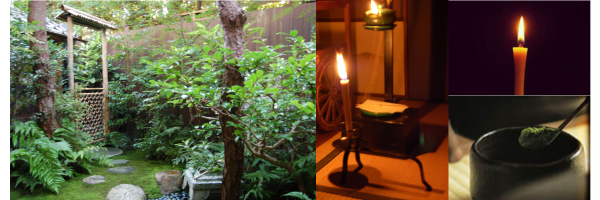
Experience
Authentic Japanese Tea Ceremony
In a beautiful, peaceful tea garden
A variety of courses available
Serene evenings by candlelight
Enjoy the experience at your own pace
English explanation in all courses
It will be an unforgettable special memory!
* Advance Reservation Required
Afternoon Tea Ceremony Experience Course (A / B) in Kyoto
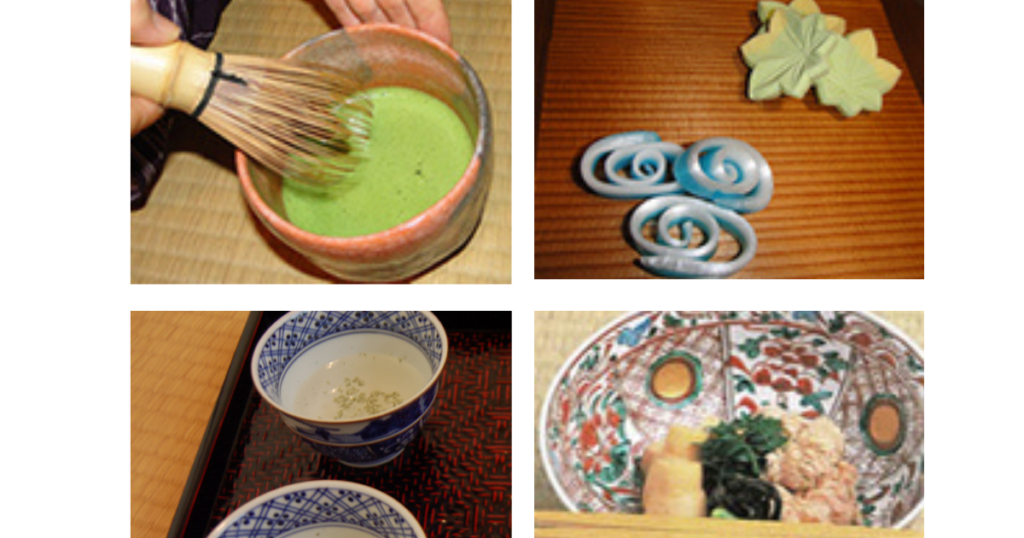
■Usucha or thin powdered green tea
It is the most common way to drink matcha and it is whisked into a fine foam on top.
■Higashi or delicate sweets
These sweets are usually made from traditional Japanese sugar and agar jelly etc.
■Meal
Rice, Miso Soup, Mukouzuke, Yakimono, Kounomono Read More
If this is your first tea ceremony, A or AL course is recommended
| A course | Thin powdered green tea and delicateme sweets, simple tea |
| Days | Tuesday, Wednesday, Thursday, Friday, Saturday, Sunday |
| Time | 14:00 / 15:30 / 17:00 |
| Duration | 1 hour |
| Participants | 2~6 people |
| Price | ¥6,000 per person |
| A L course | Thin powdered green tea and delicateme sweets, simple tea and Tea Lesson |
| Days | Tuesday, Wednesday, Thursday, Friday, Saturday, Sunday |
| Time | 13:00 / 15:30 |
| Duration | 2 hours |
| Participants | 2~6 people |
| Price | ¥12,000 per person |
| B course | Thin powdered green tea , delicate sweets , and Meal B |
| Days | Tuesday, Wednesday, Thursday, Friday, Saturday, Sunday |
| Time | 13:00 |
| Duration | 2 hours |
| Participants | 2~5 people |
| Price | ¥15,000 per person |
* Solo guest is double the normal price.
<Advance Reservation Required>
Evening Tea Ceremony Experience Course
(C / D / E / F)
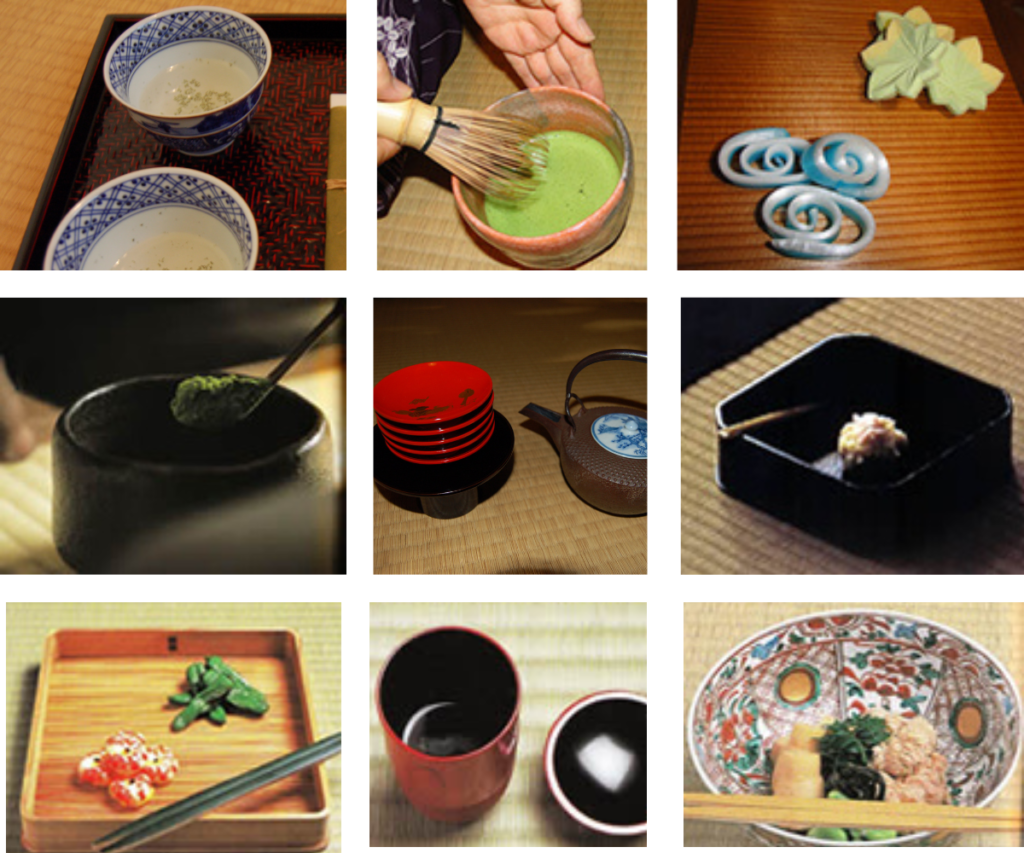
■Koicha or Thick tea
The host puts the tea powder for the number of guests (about 3 scoops of good quality tea powder per person) into the tea bowl.
■Omogashi or main soft sweet
The main moist sweet is conventionally served before drinking a koicha.
■Usucha and Higashi or delicate sweet
■Kosuimono, clear soup
Kosuimono is a small clear soup which is also called “hashiarai”.
■Hassun (two kinds of dishes) and Japanese sake
Food from “sea” and from “land”, together with a metal sake pourer.
■Meal, Japanese Sake Read More
| C course | Thick tea and thin tea with sweets (soft and delicate) |
| Days | Tuesday, Wednesday, Friday, Saturday, Sunday |
| Time | 17:00 |
| Duration | 1.5 hour |
| Participants | 2~6 people |
| Price | ¥12,000 per person |
| D course | Thin tea with delicate sweets, Kosuimono, Hassun and Sake |
| Days | Tuesday, Wednesday, Friday, Saturday, Sunday |
| Time | 17:00 |
| Duration | 1.5 hour |
| Participants | 2~6 people |
| Price | ¥12,000 per person |
| E course | Meal E, Hassun and Sake, Thick tea and thin tea with sweets (soft and delicate) |
| Days | Wednesday, Friday, Saturday, Sunday |
| Time | 16:30 |
| Duration | 2.5 hour |
| Participants | 2~5 people |
| Price | ¥28,000 per person |
F course | Meal F, Hassun and Sake, Thick tea and thin tea with sweets (soft and delicate) |
| Days | Wednesday, Friday, Saturday, Sunday |
| Time | 16:30 |
| Duration | 2.7 hour |
| Participants | 2~5 people |
| Price | ¥30,000 per person |
* Solo guest is double the normal price.
<Advance Reservation Required>
OPTIONAL EXTRAS (Garden, Haiken, Monkou Experience)
* Solo guest is double the normal price.
Tea Room Entry through the Garden
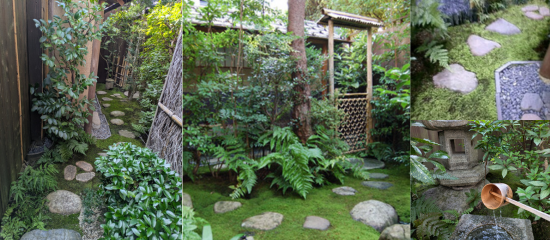
| 2,500 yen for courses A, AL, B, C, and D 3,500 yen for courses E and F will be added |
After serving a cup of light tea in the waiting room, guests change into straw sandals and proceed to the waiting bench in the garden. After exchanging greetings with the host, they purify their hands and mouth before entering the tea room. I will explain the proper way to cleanse them using a ladle. Guests can enjoy the warmth of a small charcoal fire at the outside bench. By walking through the moss-covered garden, they can fully appreciate the tranquil atmosphere and feel refreshed as they prepare to enter the tea gathering.
Without this garden option, guests can still view the garden from the tea room.
Haiken
<a viewing of the utensils>

| 1,000 yen will be added to the price of each course |
In the tea ceremony, after the tea is served, there is a viewing of the tea utensils, known in Japanese as Haiken. Some utensils may be very old or valuable, so they should be treated with care and respect.
For the guests who do not know, I will explain and demonstrate how to view the utensils properly.
One of the highlights is seeing the beautifully prepared matcha and the trace of how it was scooped by the host.
Monkou Experience

| 3,000 yen will be added to the price of each course |
Monkou is an incense ceremony with a history of over 1,000 years. In Monkou, we carefully and mindfully appreciate the fragrance. It is a wonderful way to fully experience the aroma of incense woods. The tea ceremony has also incorporated elements of this incense tradition.
Cancellation Cancellations are accepted up to 48 hours before the reserved time free of charge.
50% of the experience fee will be charged for cancellations made on the day before the reserved date.
100% of the experience fee will be charged for cancellations made on the reserved day or if you do not arrive and do not inform us in advance.
Payment We can not accept credit cards, so please pay with cash instead.
About
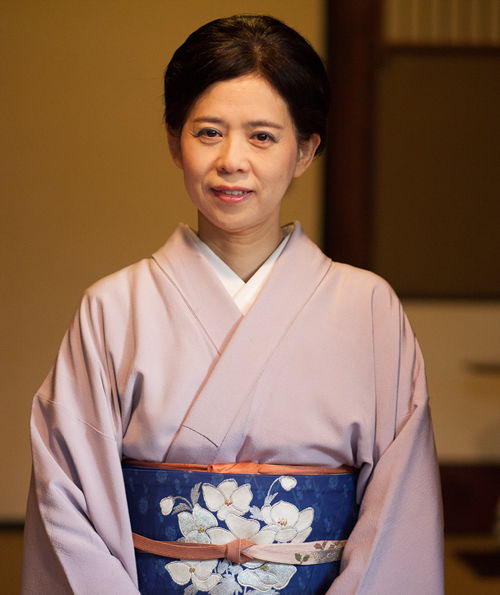
I opened my tea room, Joukeian, in Kyoto so that others could experience the world of tea that has deeply touched my life.
I would like to invite you into this world of tea.
I have been studying the Way of Tea since childhood, under the guidance of my mother and other accomplished teachers. Although the tea ceremony follows many formal rules, it is important for beginners to relax and enjoy themselves. There are only a few things to remember — the most important being to show gratitude and respect to the host and to the other guests.
Every aspect of the ceremony is thoughtfully prepared by the host — the tea room, the garden, the flower arrangement, the tea utensils, the tea itself, the sweets, and the meal. The tea ceremony values Japan’s beautiful seasonal transitions, expressing the spirit of each season through its themes and decorations. At Joukeian, you can enjoy a different theme each month.
Please come and experience the Way of Tea — an art form handed down from our ancestors — with all five senses.
I sincerely hope that you will feel the heart of tea, and that your visit will remain with you as a truly memorable experience. Thank you.
JOUKEIAN Host , Tea master < Soukou Matsumoto >
Tea Ceremony (The way of Tea)
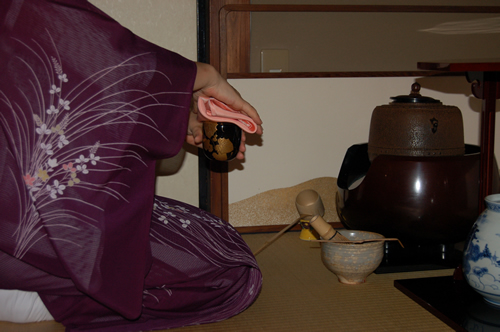
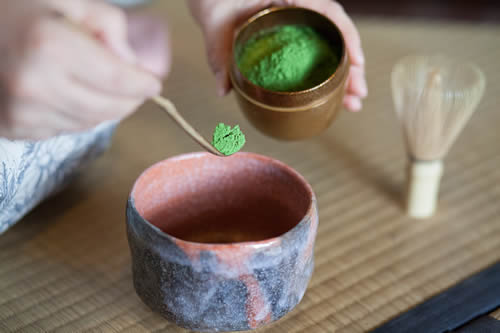
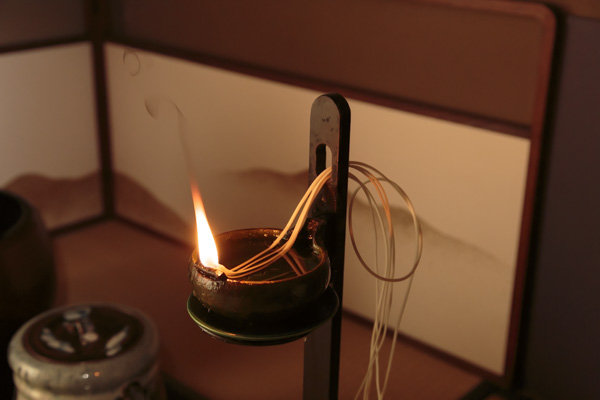
Tea ceremony is a one of Japan’s traditional culture, and it is connected with various fields of art and a highly developed spiritual culture has matured through a bowl of tea.
It is connected with various fields of art, including calligraphy, scroll mounting, flowers, ceramics, metal and iron work, bamboo and wood work, lacquerware, architecture, gardening, cooking, textiles. We might say that Chado is Japanese culture in condensed form.
Chado in Japanese is translated as “the way of tea” in English.
The spiritual aspect is important. The basic principles of Chado are expressed in Japanese “Wa, Kei, Sei, Jaku”. By learning these aspects, we seek to obtain peace of mind.
A temae in Japanese is a series of precise procedures followed to make a bowl of powdered green tea, serve it to a guest, and then to put the things away. It is one reason why the way of tea is recognized as a form of art. It is important to achieve gracefulness in the series of movements and one’s posture during the process.
However the temae is not merely a procedure for making and serving tea. Through the manners and movements of the temae, the practitioner deeply realizes the meaning of pursuing spiritual insight and deepening appreciation of art through the Chado.
The tea ceremony is not only about drinking tea. The heart of tea is also important. Through a bowl of tea, we do everything we can for the guest. The heart of tea is the heart of hospitality.
There is also a formal, full-course tea ceremony that provides the ultimate hospitality called “Chaji”.
The Chaji consist consists of two parts – for a break – First part (Chacoal procedure, Kaiseki meal, main sweet) and Second part (koicha (thick tea) and usucha (thin tea)+sweet ), and takes four hours.
At Jokeian, we offer different kind of courses in accordance with the Chaji, in a slightly abbreviated form.
 |
 |
 |